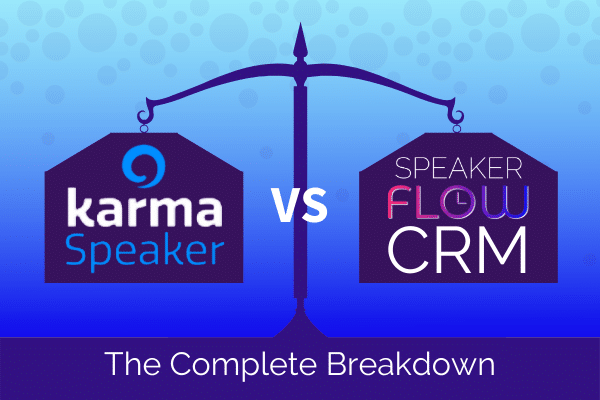When it comes to managing a speaking business, there are countless moving parts. Even if you’re only speaking part-time, there’s maintaining a website, managing contracts, and following up with leads. Fortunately, there’s a ton of technology to help you stay on track. Arguably the most crucial of these is a customer relationship management system, or CRM. The importance of a CRM centers partly around organization, as it helps you stay on top of tasks and sales. However, it also aids in simplifying your business processes. This is true in modern CRMs especially, most of which allow you to manage most of your business in one place. Because of these benefits, it’s important to choose a CRM that fits your current business needs but can also grow with you. That’s why, in this guide, we’re comparing the two speaker-specific CRMs available: karmaSpeaker and our own SpeakerFlow CRM.
However, before we go further, if you’re new to CRMs, you might be wondering, “What exactly does a CRM do?” To put it briefly, CRMs act as catalogs for leads, contacts, companies, and deals related to your business. They can also integrate with other apps and tools you currently use. That way, you can track information from all your tools in your “master” database, the CRM.
All in all, that’s an incredibly short description of CRMs. So, if you’d like more information about them and why they’re so important, feel free to check out our beginner’s CRM guide before continuing. 👍
Background of karmaSpeaker
To begin, of these two CRMs, the first to be created was karmaSpeaker. Developed in 2016, karmaSpeaker was the brainchild of speaker and business expert David Avrin and karma’s owner, John Paul Narowski. At the time it was launched, our own Chief Operations Officer, Austin Grammon, was working as the sales manager at karmaCRM and hatched the idea, with David and John Paul, as a way to serve a technologically underserved industry. The goal was to take karmaCRM, an already established system in the small business market, and tailor it to the needs of professional speakers. That way, speakers had a simple tool at their disposal to help grow their business and karmaCRM had a new direction in which to grow.
Ultimately, although the launch was successful and the product, karmaSpeaker, was initially well-received, Austin ended up parting ways with the company in 2018 in order to launch a marketing firm with our Chief Marketing and Technology Officer, Taylorr Payne. Today, the company remains under its original ownership and continues to function as a two-part brand, karmaCRM for small businesses and karmaSpeaker for speaking businesses, specifically.
Pros & Cons of karmaSpeaker
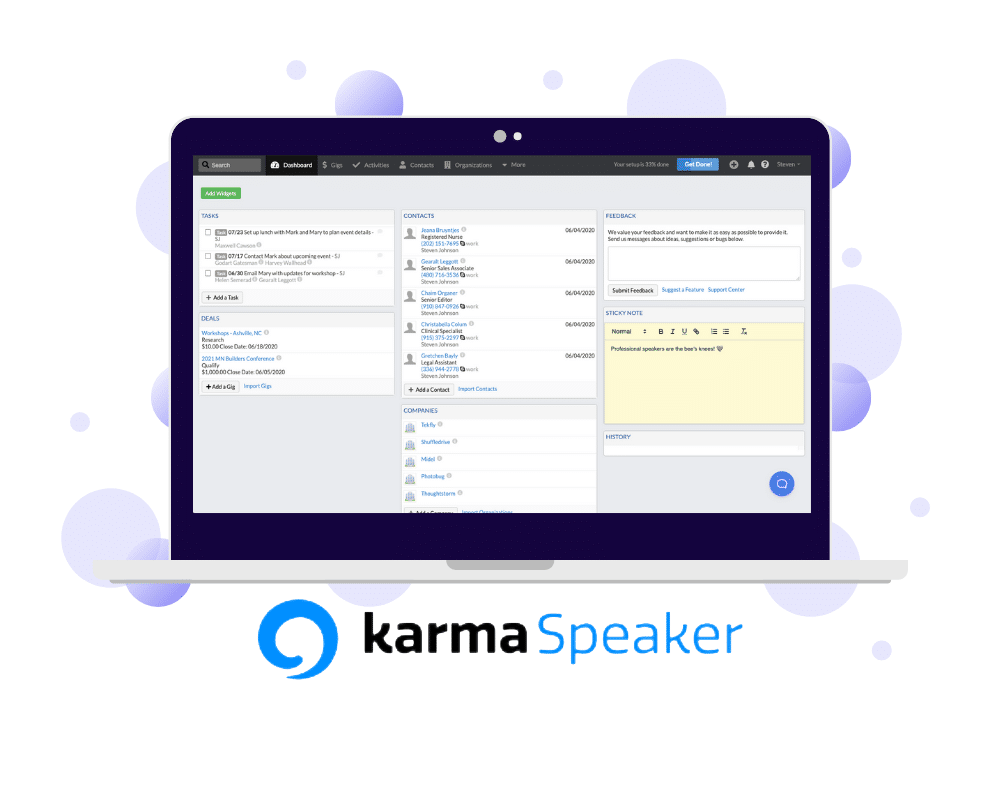
As a system, karmaSpeaker focuses mainly on simplicity. This is true both visually and where functionality is concerned, making it an undaunting platform to navigate regardless of your CRM experience. It also allows for unlimited contact, organization, and deal records, even on the lowest plan, a far cry from some of the larger CRMs, which charge higher fees for greater numbers of records. Additionally, each of the record templates within the CRM (i.e. the forms for adding new contacts, organizations, and deals) are customizable. That way, if you don’t see a spot for the information you want to record, you can add it yourself.
Lastly, as mentioned previously, karmaSpeaker is privately owned and operated by a developer who coded the platform himself. Because of this, when it comes to adding new features or integrations, much of the power to make changes is already in the hands of the people most capable of doing so.
That said, while many changes have been proposed since karmaSpeaker was created, the majority of the CRM remains unchanged from its original 2016 design. As a result, while the simple layout of the platform makes it a breeze to learn, it poses a challenge in terms of performance. Many common integrations, for example, do not exist within karmaSpeaker, including social media management applications, e-signature platforms, or even some calendar applications. There’s also a lack of complexity in the integrations that do exist, such Zapier and eSpeakers, making them less robust than those of other CRMs on the market.
Combined, all of these factors make karmaSpeaker a good option for speakers seeking a simple database for their sales information. However, if you’re looking for a robust and complex system that can grow with you and your team, it falls a bit short.
Background of SpeakerFlow CRM
That’s where SpeakerFlow CRM comes in. Built with the help of Hey Mic creator Julie Holmes, SpeakerFlow CRM originally launched in fall 2019. Combining our own research with Julie’s years of experience in the speaking industry, SpeakerFlow CRM was designed to be the single system you’d need for your speaking business. Whether a speaker was looking for email marketing tools, proposal software, or standard CRM functionality, our goal was to make it available in our platform. That way, everything could be managed in a single tool, not just sales information.
Ultimately, although we considered developing a system ourselves to meet this goal, we eventually settled on Zoho One as our base platform for the CRM. In doing this, SpeakerFlow CRM acts as a template. In other words, it overlays Zoho’s exceptional security and functionality while still providing speaker-specific modules and information. Because of this, bug fixes and technological improvements can be easily managed by Zoho’s massive, 24/7 support team. Meanwhile, our team can continue iterating on our template and making changes so that the template itself is optimized and as up-to-date as possible. Win, win!
Pros & Cons of SpeakerFlow CRM
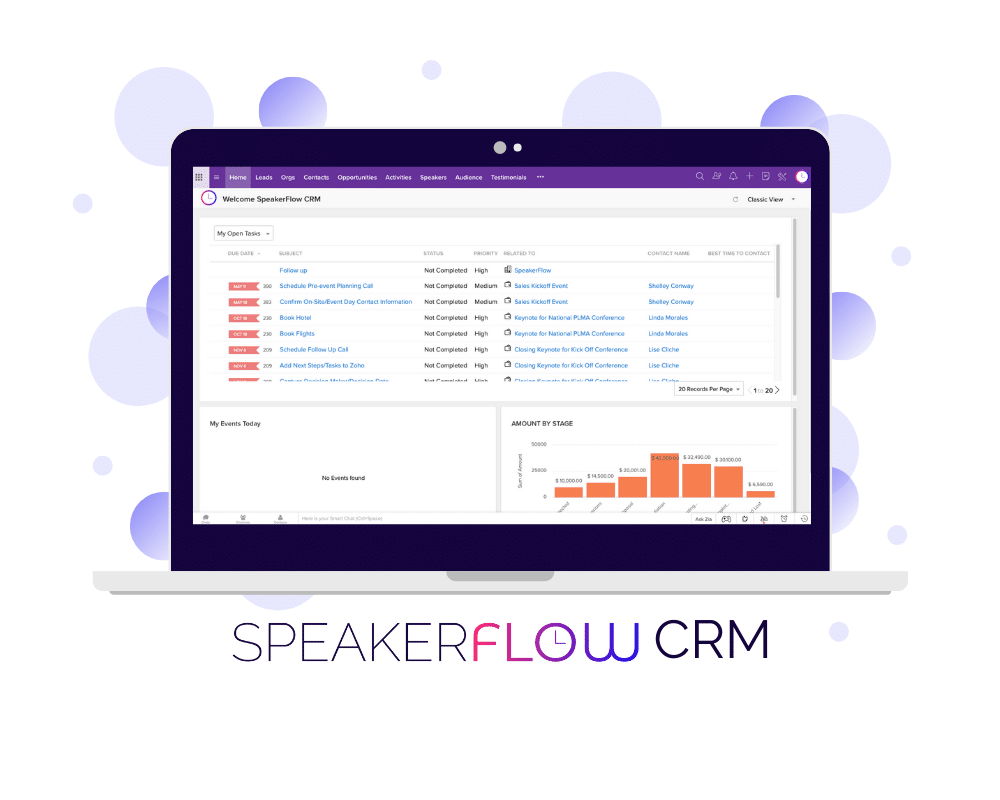
Another reason that we opted for a Zoho One base, when building SpeakerFlow CRM, was the functionality available. In considering other CRMs on the market, there are basically two ends of the spectrum. On one side are highly-functional CRMs (HubSpot, for example) that bring a hefty price tag with their usefulness. On the other side are CRMs lacking in integrations but affordable, such as karmaSpeaker. In light of these options, our goal was to find a system that fell somewhere in the middle. To sum it up, we wanted functionality and affordability all in one secure, trusted, and regularly-updated package.
As a result, SpeakerFlow CRM, comes with automatic access to more than 40 Zoho business applications, all of which are already designed to work in tandem with the CRM. It also comes with custom modules, fields, and even custom integrations specific to the speaking industry, including eSpeakers and the Speaker Intel Engine. Plus, on top of a large collection of other native integrations, SpeakerFlow CRM also includes a detailed integration with Zapier. That way, if you don’t see the app you’re looking for in its master list of integrations, you can automate a connection on your own in a few clicks.
That said, while all of these features are huge “pro”s, one “con” is the complexity of the system. Where karmaSpeaker is exceedingly simplistic, SpeakerFlow CRM is intricate. In the end, while this makes for a robust, scalable system for most speakers, it can be overwhelming for some, making it the best choice only if you are willing to put in the time to learn it yourself.
Well, technically, you’re not by yourself – you have us. We’ll talk more about that later, though. 😊
Side-By-Side Comparison
Ultimately, the greatest differences between karmaSpeaker and SpeakerFlow CRM are the differences in functionality and the depth of their integrations. As consultants, we also believe that these aspects of CRMs – no matter which you’re considering – are the most important. After all, is a tool really worth paying for if it doesn’t either (a) make your life more efficient or (b) make your speaking business more profitable? We don’t think so, anyway.
Considering that, the following chart breaks down the most commonly sought after features of CRMs, as heard in our conversations with speakers across the industry. That way, you can look for the feature you need most and make your choice based on data rather than a hunch. 👍
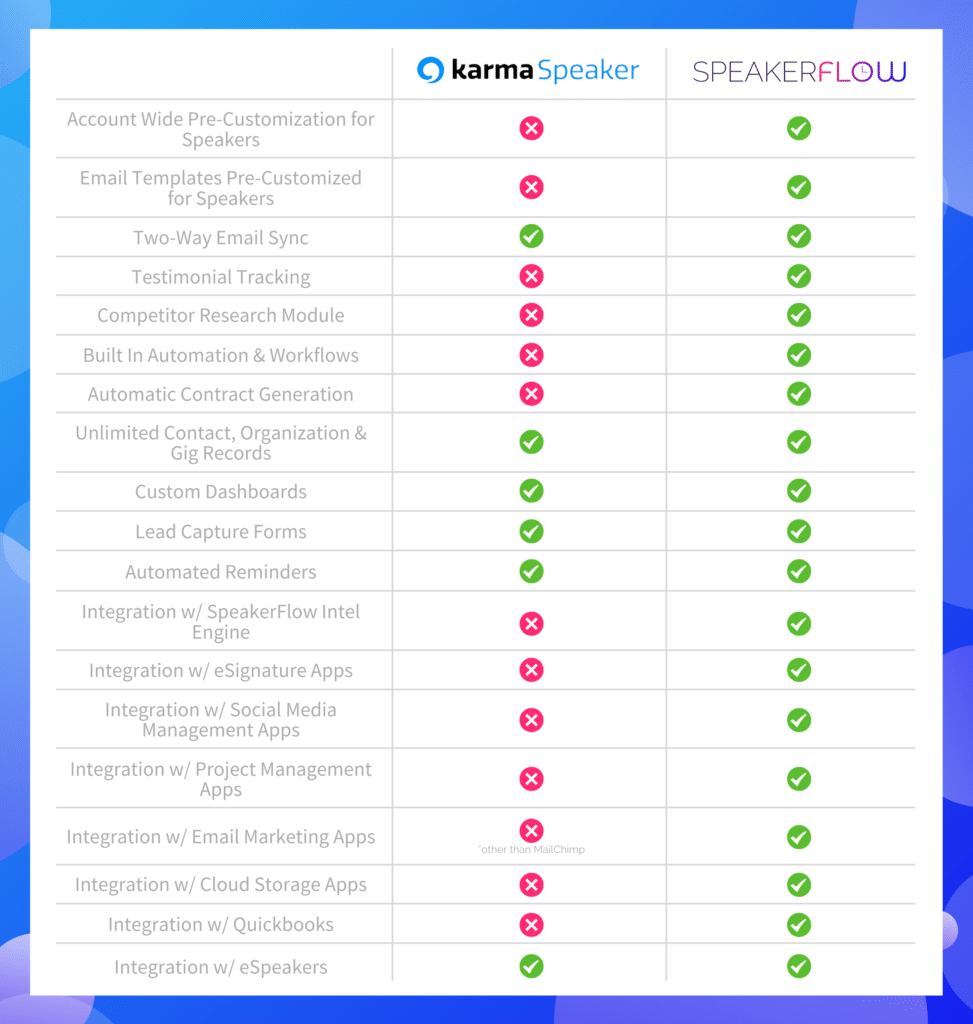
Pricing of karmaSpeaker vs. SpeakerFlow CRM
In addition to functionality, the other major concern for most speakers is price. As consultants, our team generally recommends looking for two things. First, look for the most functionality for the price. Second, look for the greatest level of functionality in a single app. Ideally, the best CRM meets both of these criteria. This allows you to stay in a central app as you manage your business and the app’s cost pays off.
karmaSpeaker Pricing
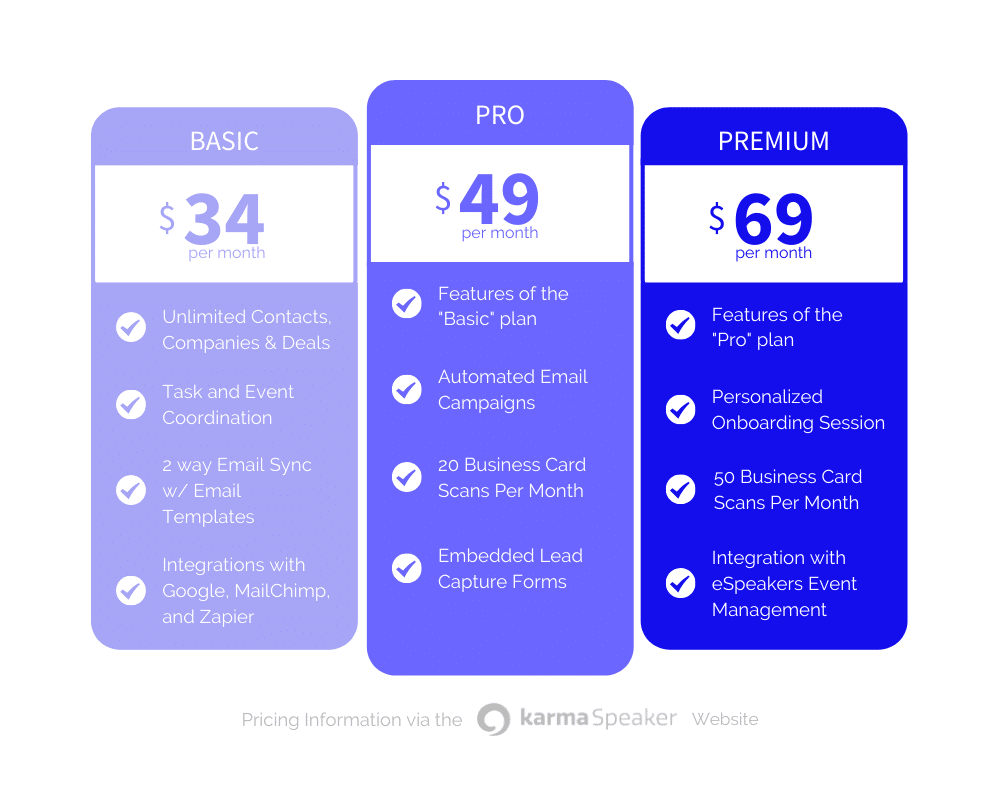
To start with, karmaSpeaker’s pricing is all subscription-oriented and is based off of the number of users on the account. The lowest tier, as shown in the image on the right, starts at $34/user/month. From there, the two higher tiers come in at $49 and $69/user/month. That said, although these prices aren’t cheap, annual purchases include a 20% discount, reducing the prices to $28, $39, and $55/user/month respectively (if you divide the yearly cost by 12 months). For each of these options, the monthly payment covers the features of the plan as well as chat support. It also allows the user access to their support center, for any frequently asked questions or concerns about the platform.
SpeakerFlow CRM Pricing
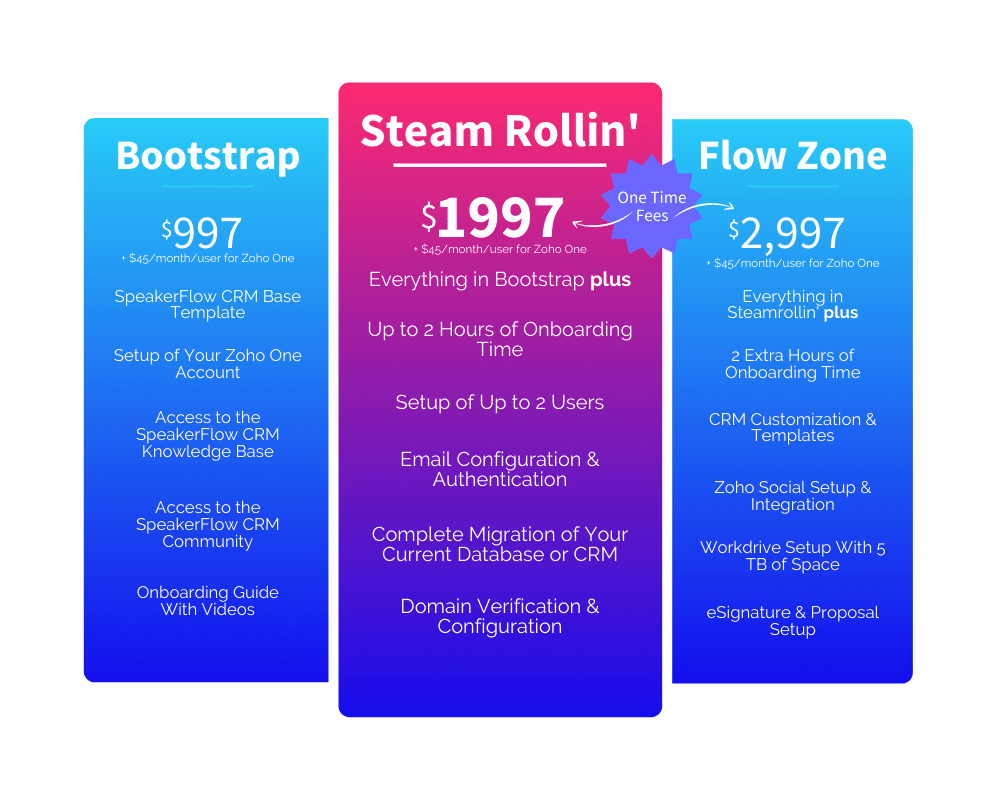
By contrast, SpeakerFlow CRM’s pricing comes in two parts. The first is an initial one-time fee for the proprietary template and onboarding time. The second is a subscription fee for access to Zoho One. Of these fees, the first (the prices for which shown at right) goes directly to SpeakerFlow. This covers our time, as we set up each account manually and, depending on the amount of onboarding time you need, our team may spend up to five hours on each account, right out of the gate. In addition to onboarding time, however, the initial fee also includes ongoing email support and access to our SpeakerFlow CRM Facebook group. From there, after the initial onboarding period, the secondary subscription fee of $45/user/month goes straight to Zoho. This covers 24/7 access to their support team as well as access to all of the aforementioned Zoho business apps and integrations.
In short, although SpeakerFlow CRM’s initial fee is an additional cost, the subscription fee for SpeakerFlow CRM – and all the Zoho business apps that come with it – is about the same as karmaSpeaker’s lowest pricing tier. Additionally, once you’ve paid the initial fee to SpeakerFlow, you don’t owe us a dime! All of the money we earn, in payment for our onboarding time, is paid upfront. That way, you know you’re not having to pay extra each month and we can afford a support team. We figured it was more honest that way. 🤷
In Conclusion…
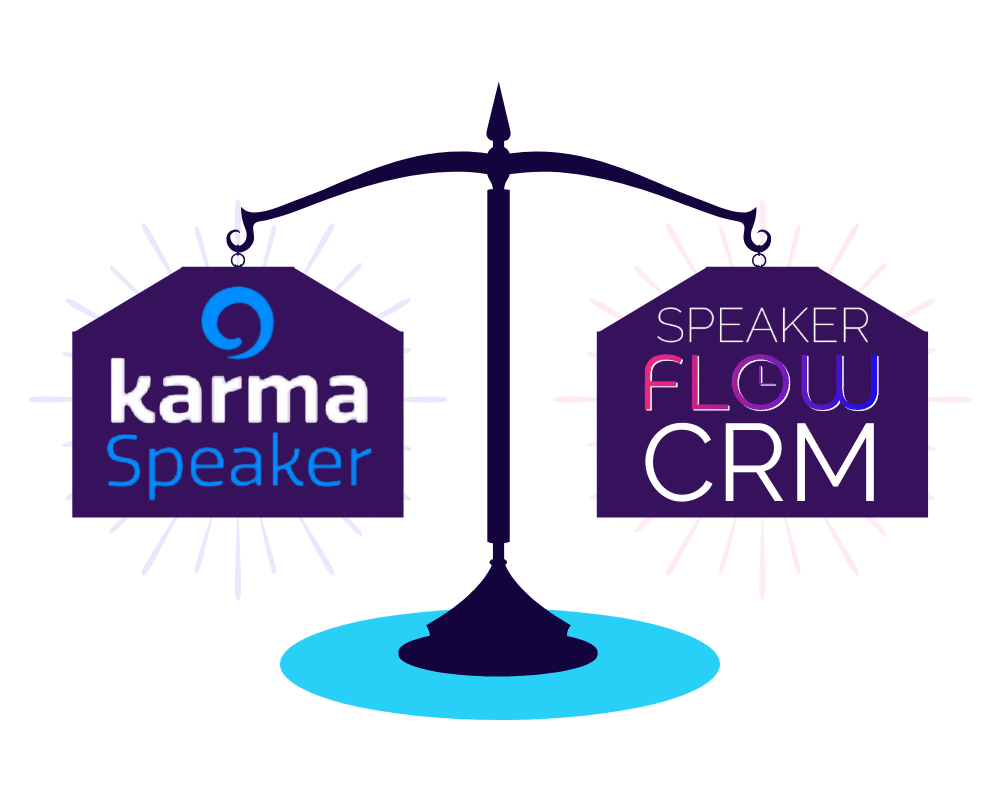
Ultimately, the best CRM for your business depends on the size of your team, your budget, and your technical needs. If you’re a part-time speaker, just looking for a simple place to keep your contacts, karmaSpeaker will work just fine. On the other hand, if you’re looking for a system that will grow with you, as your team expands and as you seek to automate more and more of your sales process, SpeakerFlow CRM is a better bet.
In the end, I recommend checking out both systems and seeing them for yourself. On the SpeakerFlow side, we’re happy to meet with you as many times as you need. As a team, we want you to be confident in your choice, even if that choice is “I don’t think SpeakerFlow is a good fit for me”. After all, every speaking business is a little different. As a result, the needs of every speaking business, when choosing a CRM, are bound to vary a bit. The important thing is to choose one – period. I promise, your sales will thank you. 🤗
For more information about SpeakerFlow CRM, check out our demo video or book a personalized demo with us! Even if you’re just dipping your toe into the waters of choosing a CRM, we’re already excited to meet you.


